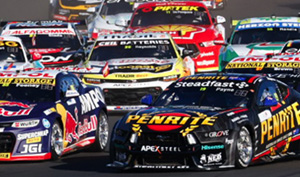FORD Performance global boss Mark Rushbrook has upped the ante in calling for more data transparency in Supercars amid its winless stretch.
Chevrolet Camaros have been first across the line in all 12 races to start the maiden Gen3 season, although Race 1 of the Newcastle 500 was belatedly awarded to Mustang star Cam Waters.
Ford has publicly expressed parity concerns ever since the 2022 Adelaide 500; a last-minute VCAT re-run before Newcastle satisfied the Blue Oval on the aero front but even then Rushbrook said engine performance would need to be monitored.
From Albert Park onwards, talk surrounding engines and mapping has arguably been at an all-time high – with a big part of the problem being the mystery surrounding what actually is the cause of the alleged deficit.
“We weren’t saying that we didn’t have parity pre-season, we were just saying we didn’t have the confidence based upon the data that we had so far and we had to see how the racing played out,” Rushbrook explained.
“That’s gone now four rounds and certainly on-track results are one thing but on-track results are not necessarily representative of technical parity; you need to look at the data for technical parity and that’s where we continue to work with Supercars.
“We are certainly in favour of transparently sharing that data so that we can form conclusions on technical parity.
“In an absence of that, we all struggle, as OEMs, as teams, as fans of the sport, so we continue to look for that.
“I do know that Supercars is committed to some testing to continue to refine the product as it is presented on-track as well I would say a more robust consideration of what we need to do as a sport for improving technical parity to be modernised to the cars that we have today.”
He doubled down by claiming Supercars lacked in data transparency compared to other categories around the world.
“In every racing series outside of Supercars we have full transparency into the data and we know what we are doing relative to our competitors on-track,” said Rushbrook.
“So we know where we as a manufacturer may be falling short or succeeding, or our partners whether it is an engine partner or a team, we have that as a dashboard in front of us.
“We don’t in Supercars. So to be honest with you, we can make observations based upon what we see on-track and what data is available from our teams, but until there is data transparency, we can’t draw clear conclusions on engine parity or anything else.”

Supercars recently inspected a transient dyno in Melbourne and ordered two sets of torque sensors to heighten its ability to gather data and step up its investigation into any potential disparity.
Rushbrook believes such processes should have already been in place, but Supercars had stuck to its guns on its established parity process.
“Certainly I would say that there has been some progress and there is a sense of urgency to continue to make improvements, both near-term in terms of calibration changes which I would say are more on the interim containment plan, as well as commitment from the series for torque sensors and transient dyno which is unfortunately longer term.
“Those things are all long lead and we wish they were in place already before the start of the season but at least there are actions in place to have them on-hand.
He added: “Every engine that we develop in every series we run on a transient dyno, usually both a transient engine dyno and also a transient driveline dyno which includes the full engine and full driveline out to the wheelhouse.
“So I think it should be an indication that if automakers that are involved in motorsport on a global basis are using transient dynos to develop the engines, we’re using them for a reason because there is a lot of available information that you get on the transient dyno that you don’t otherwise.”

Either way, he has unwavering confidence in the Coyote powerplant.
“I have utmost confidence in what the hardware is capable of with the Coyote engine and the software that controls it and the people that are working on it,” declared Rushbrook.
“We have got great partners in Australia’s Supercars with our homologation team (Dick Johnson Racing) and our engine partner with Herrod (Performance Engines), just like we have great partners around the world and we are able to race Coyote-based engines competitively in other series and do great things with it.
“So I have got confidence in that. Ultimately though it is the technical parity process that determines whether that engine hardware and those great people are capable of delivering.”
Ford Supercars teams are set to experiment further with engine mapping during testing this week, tomorrow at Winton and on Thursday at Queensland Raceway.




